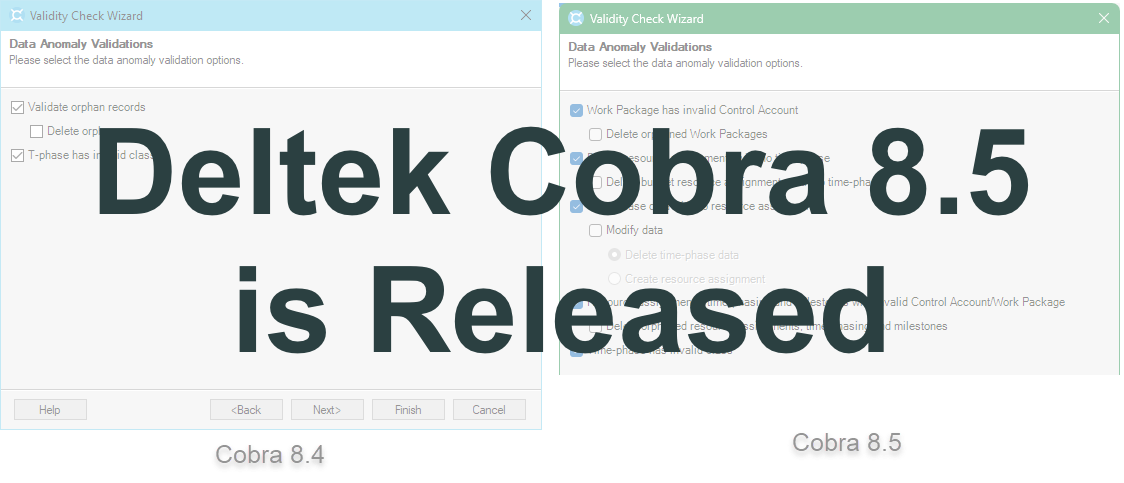

Released today, Deltek Cobra 8.5 brings a host of new capabilities, enhancements and conveniences to the earned value community. We’ve been digging into this brand-new iteration and are excited to be giving you an overview of what’s new and improved in this latest version.
OK, let’s jump right in and give you the highlights of what we are seeing in this new Deltek Cobra 8.5 system.
As mentioned in our previous article, Deltek Cobra 8.5 is a release focused on compliance with new specifications from the Department of Defense (DoD), and the Department of Energy (DoE) concerning the JavaScript Object Notation (JSON) format.
Starting with the DOD’s IPMDAR JSON file export, Deltek are adding a CLIN option to the Project Audit dialog. It’s an optional extra for those that wish to track the Contract Line-Item Number in their audit log and JSON exports.
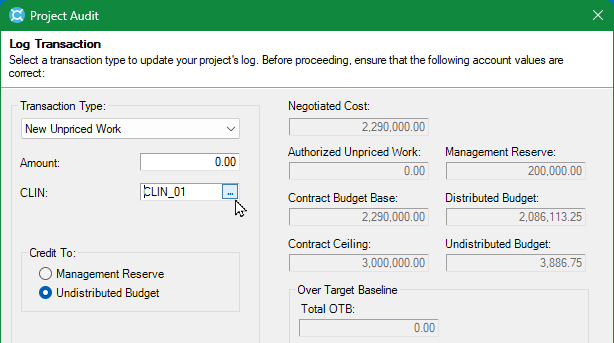
CLIN Log Transaction
The CLIN dropdown field in this dialog is activated by creating a CLIN Code file, and then assigning it to one of the Control Account Codes’ positions in the Fields tab of the Project Properties dialog. Once you do that, you can then assign it in the CLIN Code: dropdown field, also within the Project Properties dialog. Once done, you can select a CLIN value that appears in the Project Audit dialog.
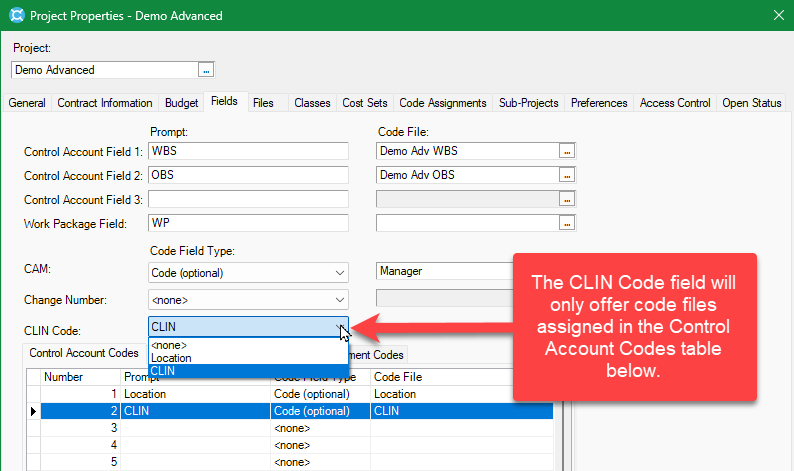
CLIN Fields Assign
When you export your IPMDAR JSON files via the Cost Data tool in Integration, you will see the CLIN option offered for export along with other Control Account codes.
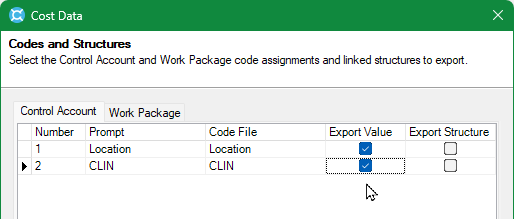
CLIN IPMDAR Option
For those of you who execute projects for the Department of Energy, you will likely be pleased to learn that Deltek has added a new feature to support the recently published Data Item Description (DiD) v04.00_2023_03_22 for the DoE Project Assessment and Reporting System (PARS) JSON export format. This DID replaces the earlier Contract Project Performance (CPP) upload format that required .CSV or .MDB formats. But, more about the particulars of DOE PARS in a later article.
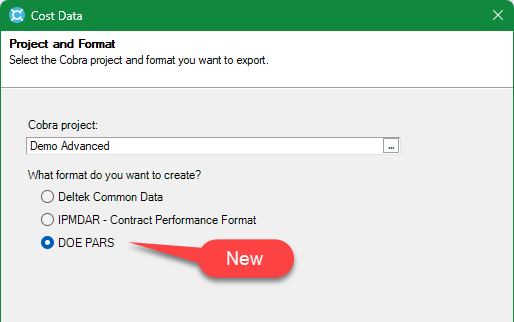
DOE PARS Export
Operating in similar fashion to the DOD’s IPMDAR, an additional wizard option walks you through the steps to produce a compliant export format containing a set of JSON files that can be uploaded to the DOE’s PARS system. Accessed via the Integration ribbon, the Cost Data tool now provides an additional DOE PARS option (shown above).
For this to work there are a number of additional steps you may have to make in your project’s WBS code file, for example, depending on its current structure. You will need to have code files that represent a Work Package Manager, WBS Type, Charge Code, and Work Package codes in place within your WBS file before you can populate the Cost Data export for PARS.
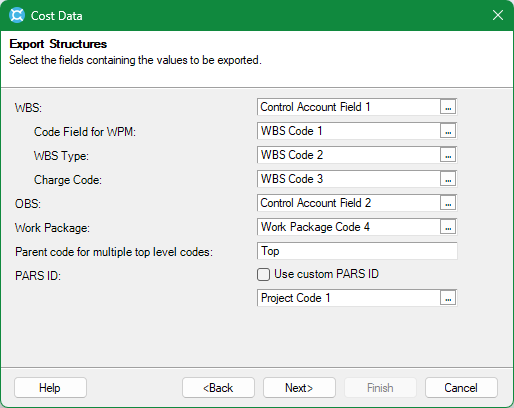
DOE PARS Export Example
You also have to use one of the Project Codes to provide a four-digit PARS ID value. We will publish a more detailed synopsis of these requirements in a future blog. This will have examples of a typical setup that you can download and restore to your Cobra system to see what a working setup looks like. This will make a good template if you ever need to setup Cobra for DOE PARS reporting.
Another major change to the software is concerning the Backup and Restore feature. Our old friend the .CMP file gets to ‘hang ‘em up’ after more than 30 years of project-saving service. And believe me, that old format has saved mine and my customers’ bacon a few times over the years.
It is being replaced by a new file format with a .BKCP extension. This is apparently a rewrite of the entire backup/restore code in Deltek’s continued efforts to retire remaining FoxPro 9 code.
For those of you who’ve been using Cobra for a few decades, you’ll remember the earlier versions were developed in Visual FoxPro. Deltek’s first .NET release, Cobra 5.0, was the first step in retiring this now defunct platform and they continue to replace code with each new release.
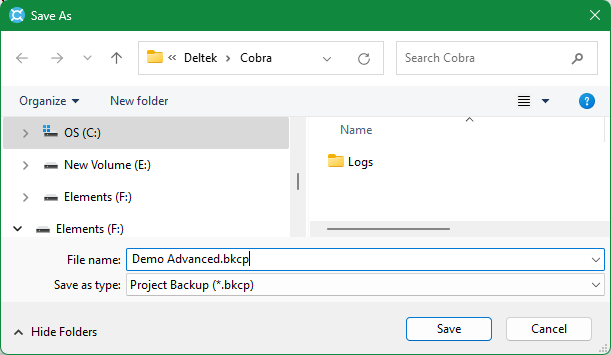
Cobra 8.5 Backup BKCP Format
Any backups created with Deltek Cobra 8.5 will be in this new format. Do not be concerned however, you can still open the Legacy .CMP backups, along with the .CBR, .CFT, .CRP, and Integration Configuration backups. If you do restore an earlier CMP file using the Legacy options in the Save As dialog, you will see Cobra creating a converted copy of the former CMP file to the new BKCP format.
Because the Restore processes’ Open dialog defaults to *.BKCP, you just need to be mindful to use the ‘Save as type:’ dropdown field to see your CMP backups by selecting the legacy formats listed therein.
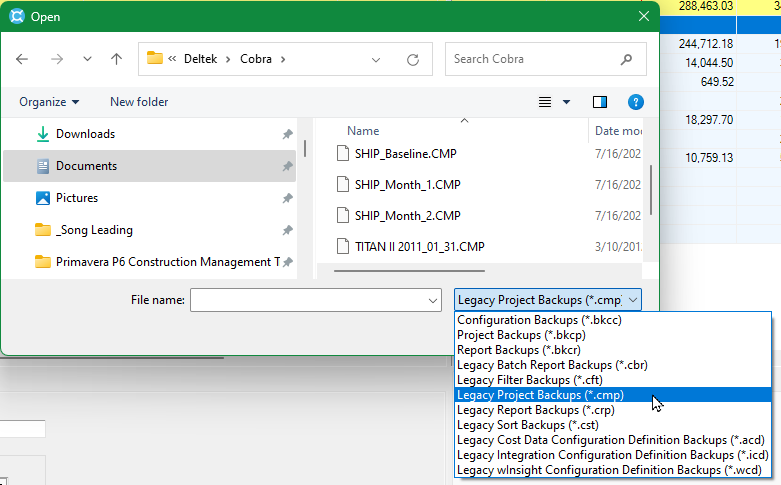 Restore CMP And BKCP
Restore CMP And BKCP
Moving on now, another item that goes towards compliance is variance reporting. Until now, if you wanted reports to highlight variance you had to adjust the ThresholdFilterCompareType tag in the Reports Definitions dialog of the reports. The AND and OR option was inserted into the tag (shown below) depending on your requirement.
This had various limitations. First, it was somewhat stealthy, being tucked away in the report definitions tags. Second, it meant you had to create reports for any projects that had a different AND/OR threshold reporting requirement.
In Cobra 8.5, the options are both, far easier to find and more granular, by being featured in the Thresholds tab of the project’s WBS, or other pertinent code files. It allows you to identify a mixture of AND or OR scenarios for each record in the Thresholds grid.
The fact that these can be stored within the project’s code files, and not in the report definitions means you won’t have to create project-specific reports in order to have your thresholds correctly highlighted; a key benefit if your thresholds vary from project to project.
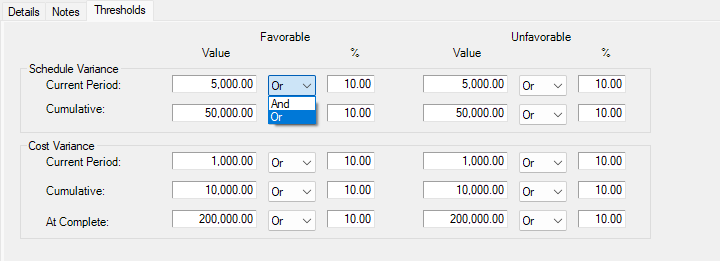
AND/OR In Thresholds
Note that you will only see the AND/OR fields when ‘Both’ has been selected in the Thresholds tab.
When you create new projects in Deltek Cobra 8.5, you will notice that there are two new Cost Classes automatically added: i.e., ReprogCVA and ReprogSVA. They also arrive with their own like-named Cost Sets. For those who might work with an Over Target Baseline scenario, this adds convenience to the process. Previously, it was necessary to create your own Cost Classes and Cost Sets in order that the values appeared in the Format Reports.
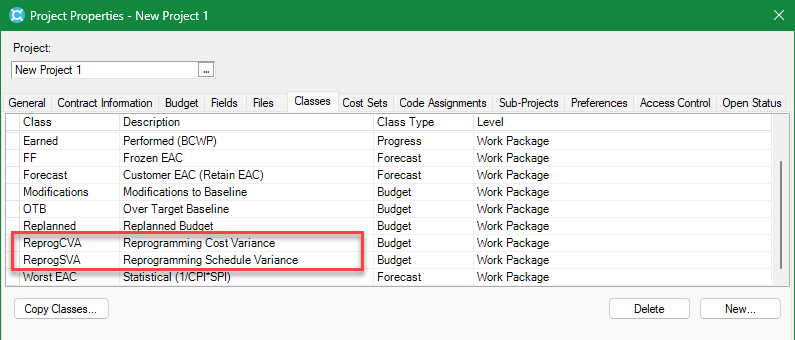
ReprogCVA and ReprogSVA
The CPR Format 1 and 2, and IPMR CPR Format 1 and 2 reports have these new Cost Sets built in. If you have existing projects that use differently named Cost Sets for reprogramming this will not change anything and they will work as before. Any new projects created will have these new Cost Sets.
This functionality extends to the Data Exports for IPMDAR and the Deltek Common Data Exchange (DCDE) exports.
If you wish to add these Classes and Costs sets to existing ‘pre-upgrade’ projects, you can use the Data Tool’s ‘Initialize Cobra System Data option to add these new reprogramming classes and sets to existing projects.
If you’ve ever used the Zero-out Data tool, you may recall that it leaves the resource assignment in place, but with zero hours/dollars values in the project. While in some situations this does leave a good audit trail of change within the project’s data records, Cobra 8.5 gives you the option to actually remove the entire resource record.

Zero-Out Data
In the following screen shot you will notice the options to not only ‘Zero-out Data’, but also to actually ‘Delete zero-value resources when zeroing-out all periods’, but also to retroactively ‘Delete existing zero-value resources’. Rather awesome, what!
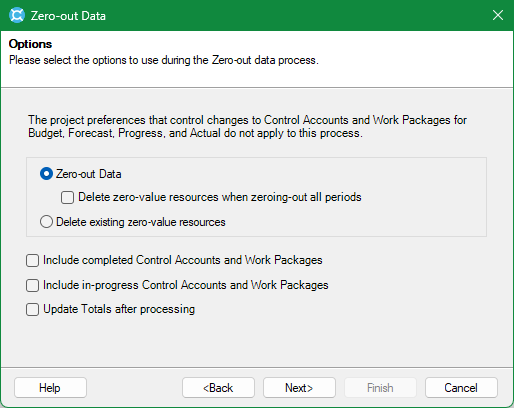
Zero-out Data Options
So, if your TPHASE table is getting a little bloated, and there’s no contractual reason to keep the zeroed resource assignments in your project, you can do a little housekeeping with the latter mentioned option.
If in doubt about using this new option on a previously reported project, you can always create some before and after reports to show an auditor what you did, when you did it, and why. In all my years in this business, I’ve found that clear documentation of change is your safest bet. Most reasonable auditors recognize your commitment to maintaining the integrity of the project data when you are clear in your record keeping.
Speaking of housekeeping, let’s look now at the expanded and improved options of…

Deltek Cobra 8.5 Validity Check
Some of the larger players in the EVM space have been lobbying Deltek for more control and more options in Cobra’s Data Validation feature. Deltek have responded by increasing the functionality of the Validity Check wizard in order to accommodate these requests. We created some screen shots of some of the additional options, and compared them to the current 8.4 version. This is what we observed:
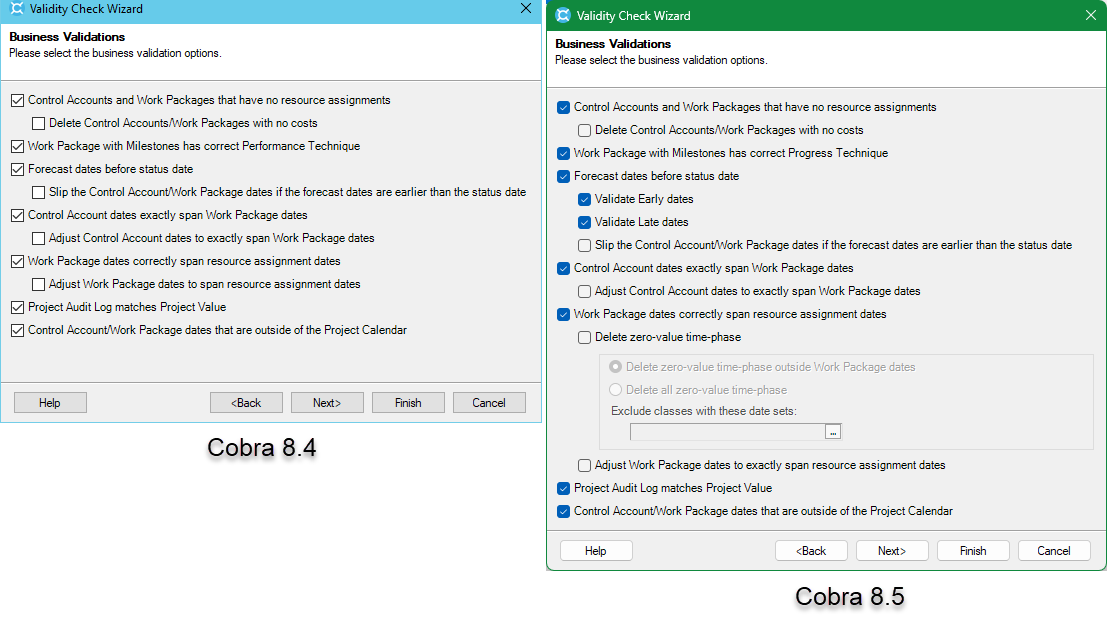
8.4 – 8.5 Business Validations
Forecast dates before status date: Validate Early and Last date options have been added.
Work Package dates: Delete zero-value time-phase has been added with two sub-options to Delete zero-value time-phase outside Work Package dates, and Delete all zero-value time-phase, along with an Exclude classes with these date sets: option.
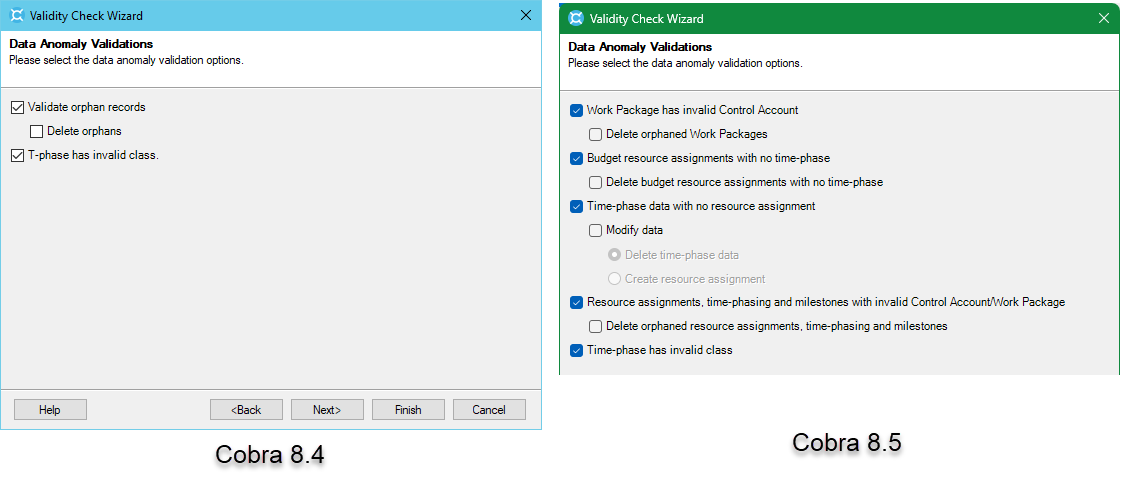
8.4 – 8.5 Data Anomaly Validations
Additional validations in the Data Anomaly Validations dialog have expanded on the Delete orphan records option and are as follows:
Work Package has invalid Control Account, with a sub-option to Delete orphaned Work Packages.
Budget resource assignments with no time-phase with a sub-option to Delete budget resources with no time-phase.
Time-phase data with no resource assignment, with sub-options to Modify data according to the Delete time-phase data, or Create resource assignment radio buttons.
Resource assignments, time-phasing and milestones with invalid Control Account/Work Package, again with a sub-option to Delete orphaned resource assignments, time-phasing and milestones.
We also heard that there are some administrative controls to disallow folks to delete certain elements within the EMP Security Administrator, but we don’t yet know the extent of this. So, there may be more to talk about in this area, and we’ll be sure to add details upon completing our own analysis of the new version.
Continuing updates to the Primavera P6 Web Services integration have also been included in this release. This is to mitigate Oracle’s stated intention to drop support for the Integration API in the near future. Word is that Deltek do plan to maintain support for the Integration API for the time being, but if you are currently using the API, it will be worthwhile migrating to the Primavera Web Services integration at your earliest convenience.
As a side note, we’ve been taking a closer look at Deltek’s own scheduling solution, Open Plan Professional. The integration between Cobra and Open Plan is seamless, without dependence on Web Service configurations or deprecated APIs. Indeed, Cobra and Open Plan share the same data schema. So, for those organization that like the power of a serious on-premise client solution similar to P6 but are concerned for the P6 client’s longer-term maintenance and support prospects, it might be worth keeping an eye on Open Plan as a low-risk alternative in the future.
It’s out of scope for this article, but suffice to say we are aware of Deltek continued commitment to development of Open Plan Professional. The more we dive into this scheduling system, the more we recognize its impressive scheduling capabilities.
In fact, this recently resulted in a $1M+ Open Plan investment by one of the biggest and most influential customers in the earned value defense contracting space. It appears we’re not the only ones who’ve noticed!
Another nice add, is the ability to set the opening percentage for User-defined EVTs within the scheduling tool rather than having to set these after integration. This will involve adding a new activity code field to your P6, Open Plan, or Microsoft Project schedule.
For example, if you wanted to do a 20-80 split on a User Defined EVT, a user-defined Opening Percentage number field can be used to pass this ‘20’ value to the Cobra baseline. This sweetly plugs a long-standing gap in the schedule integration configuration no matter which of these tools you use.
This is somewhat anecdotal, but have you noticed that as each Cobra version is released, it seems you have to use the Save and Update Totals buttons less and less?
While this may not be prevalently highlighted in all the release notes, it appears that Deltek are triggering more and more of these functions automatically; usually tacked on to the end of another process, as it were.
For example, in many years past, I would run the Update Totals function after, say, a Calculate Forecast process. Now it just does it for you. Dare I rattle the walls with an unreasonably loud “YAY!”? The reason for my enthusiasm is that, the less I have to think about the nuances of the software tool (and the fewer processes I have to remember to initiate), the more I can concentrate on the integrity of the month-end reports.
From a technical standpoint this makes total sense. For a start, Cobra was borne in the mid-1980s. Back then everything was way, way slower; CPUs, Networks, Databases, Disk Drives – you name it. So, it was basically an imperative to give the user options – particularly before running processes on very large projects. Not to do so would be negligent because this could potentially bog down the entire system with comparatively snail-like data and network throughput. It should only be run with full awareness of the possible performance impact by the initiating operator.
With today’s incredible speeds and processing power, however, much of this cautionary coding is probably unnecessary; a solution to a problem that no longer exits. And so, todays Cobra operators benefit from Deltek commitments to improve both performance and the user experience; clearly by paying attention and asking the question – “Is that still relevant?”.
In summary, here are the broad strokes of what we’ve shared about this new release.
Compliance is clearly a focus to meet the evolving demands of the DoD and DoE, as JSON upload formats replace the current IPMR Format reports. The optional CLIN values bring more detail to the Audit process, and the updates to the threshold options increases granularity for the threshold reporting ‘AND/OR’ settings in the current IPMR reports.
A rewrite of the backup/restore feature sees the introduction of the new .BKCP format. You can still restore CMP format backups using the Legacy options found in the Open dialog’s “File Name:” dropdown. Just remember the Restore tool defaults to *.bkcp, so don’t be alarmed if you go to a backup folder and it looks empty. Just click the File name dropdown and choose Legacy Project Backups (*.cmp).
Variance Reporting sees a more granular approach with the addition of an AND/OR dropdown field between any thresholds set to ‘Both” in the Thresholds tab. This offers far greater control over the way variance is reported in the system between the Current, Cumulative, and At Complete threshold options.
For projects created in the Deltek Cobra 8.5, version Reprogramming (OTB) Support enhancements include the default inclusion of ReprogCVA and ReprogSVA Cost Classes and like-named Cost Sets. Previously, you would need to create your own cost classes and cost sets to populate your format reports when an Over Target Baseline (OTB) scenario was in play.
There are improvements to the Zero-out Data feature that allow you to not only set a resource’s hours and cost to zero, but also entirely delete the resource from the work package. Moreover, you can retroactively remove previously zeroed resource records done in 8.4 or earlier. Another win for all us neat freaks out here who don’t like clutter in our EV data.
The additional Validity Check options will be welcomed by most customers in this space, giving them greater control over the details of the delete options, as well as who can make such changes.
For a while now, Cobra has been supporting integration with Primavera P6’s Web Services. This release sees further enhancements and improvements to this solution, and brings a supportable API integration back to the table. In times past, we’ve had many support calls from customers looking to use the earlier Primavera Integration API for their time-phased baseline and change control updates.
However, with Oracle’s dwindling support of this Java-based API, it’s been harder and harder to get these customers to a working solution, and indeed, for them to upgrade their P6 systems when Cobra integration is a must. It’s been a long and challenging road, but we hope that this solution brings a stable path forward for our P6/Cobra EVMS user base.
As always, we appreciate that Deltek has refrained from making any fundamental changes to the user interface, so it’s business as usual for all us Cobra experts; with a small learning curve and hopefully reduced workload, as you engage with the new and improved features of Deltek Cobra 8.5.